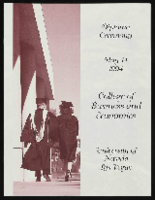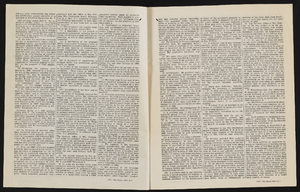Search the Special Collections and Archives Portal
Search Results

Transcript of interview with Juanita Kilburg by Vincente C. Camacho, March 7, 1981
Date
Archival Collection
Description
On March 7, 1981, Vicente C. Camacho interviewed accounting clerk, Juanita Kilburg (born September 25th, 1923 in Los Angeles, California) on the second floor of the UNLV Dickinson Library. Kilburg explains how her family first moved to Southern Nevada and her father’s ties to the railroad. She then goes on to explain the growth of the military and Nellis Air Force Base. The interview concludes with a discussion on her work with the American Legion service organization.
Text

James L. Hogan interview, October 12, 1975: transcript
Date
Archival Collection
Description
From the Ralph Roske Oral History Project on Early Las Vegas collection OH-00871. On October 12, 1975, collector Mary B. Hogan interviewed her father, farmer James L. Hogan (born April 6th, 1909 in Winton Place, Ohio) at the Hogan family home, in Las Vegas, Nevada. The interview covers the life of a Las Vegas old-timer. Mr. Hogan discusses moving to Las Vegas, early Las Vegas, Boulder Dam, and the Stewart Ranch. Colonel T. W. Miller and Vic Whittlesea are also mentioned.
Text

Transcript of interview with Russell Grater by Frederick Dougan, February 10, 1977
Date
Archival Collection
Description
On February 10, 1977, Frederick Dougan interviewed Russell Grater (born 1907 in Lebanon, Indiana) about his career in the U.S. National Park Service. Grater first talks about his move to the Southern Nevada area and his work that impacted the Hoover Dam project. He then talks about the town of St. Thomas, Nevada, the Lost City, and the activities of tourists. Grater also talks about his work in excavation, the indigenous American Indian tribes of the area, findings on petroglyphs, and the types of wildlife that were found in the area. He later talks about findings related to fossils, gold mining, the effects of World War II on the dam project, and vegetation in the area.
Text

Transcript of interview with Russell K. Grater by James M. Greene, November 25, 1974
Date
Archival Collection
Description
On November 25, 1974, collector James M. Greene interviewed Russell K. Grater (born November 16th, 1907 in Lebanon, Indiana) in his home in Boulder City, Nevada. This interview offers an overview of the United States Park Service. Mr. Grater also offers an overview on the history of housing developments in the Las Vegas Valley and Nelson Township. The interview concludes with discussion on the leaf system of local plants.
Text

Edith Leavitt interview, February 7, 1977: transcript
Date
Archival Collection
Description
On February 7, 1977, collector Enrico Messina interviewed Edith Leavitt (born April 12th, 1924, in St. George, Utah) at her home in Las Vegas, Nevada. In this interview, Mrs. Leavitt talks about teaching in Southern Nevada, including in the Virgin Valley and in Las Vegas. She also discusses the changing education system in Southern Nevada during her time as an educator.
Text

Interview with Stephen Craig Ronshaugen, November 26, 2004
Date
Archival Collection
Description
Text

University of Nevada, Las Vegas (UNLV) College of Business and Economics Diploma Ceremony program
Date
Archival Collection
Description
Commencement program from University of Nevada, Las Vegas Commencement Programs and Graduation Lists (UA-00115).
Text

Patricia Vazquez interview, November 14, 2018, June 14, 2019: transcript
Date
Archival Collection
Description
Session 1: Interviewed by Marcela Rodriguez-Campo. Barbara Tabach also participates in the questioning. Session 2: Interviewed by Rodrigo Vazquez. Monserrath Hernandez also participates in the questioning. Patricia Vazquez was born and raised in Las Vegas, NV and shares her experiences growing up in the Valley as a Queer Latina. At a young age, she remembers traveling back and forth between Mexico and the U.S. to visit family. When she started school she shares how her home language, Spanish, became her family's "secret language" as she began to learn English. During elementary school Patricia was tracked into the special education program, and remove from the mainstream classroom. She would find her love for learning in books and libraries as she taught herself how to read in English. Despite being tracked into less advanced courses, Patricia would end up taking AP/ Honors courses in high school after forging her favorite teachers signature, which changed her educational trajectory. After coming out to her family, Patricia went nearly a decade distanced from her mother and continued her college education at Arizona State University. There, she would complete a bachelors in painting and a masters in comparative literature. Her work with the Chicano Studies program at ASU helped her develop her Chicana identity and begin her involvement in social activism. In Las Vegas, she worked to fight for marriage equality and LGBTQ rights with the American Civil Liberties Union , and later with the Progressive Leadership Alliance of Nevada. She also conducted several lectures for the Latino Youth Leadership Conference on sexuality, gender, and homophobia for over a decade. She has served as an English Professor at the College of Southern Nevada for the last 20 years and is an avid hiker, traveler, and painter.
Text

Transcript of interview with Patricia Mulroy by Stefani Evans and Claytee D. White, January 03, 2017
Date
Archival Collection
Description
Patricia Mulroy served Las Vegas as the general manager of the Las Vegas Valley Water District from 1989 to 2014. She served the state of Nevada as the general manager of the Southern Nevada Water Authority from 1993 to 2014. Patricia helped to build the Authority, and saw the state through the devastating drought of the Colorado River. Patricia was born in Frankfurt, Germany on February 24, 1953. As a young girl, she lived in several different countries, but always felt that the United States was her home. Her experiences abroad fed her to develop a fascination with government work and state service. She arrived in Nevada in 1974 to attend UNLV. In 1989, Patricia became the general manager of the Las Vegas Valley Water District. She entered the field at a tumultuous time, facing the drought of the Colorado River and tension within the districts. She pioneered the Water Authority, which revolutionized Southern Nevada’s water rights system and allowed the districts to deal with the issue cooperatively. She worked with other Southwestern states and Mexico to support Las Vegas and Nevada through the drought. Patricia retired in 2014, but has chosen to remain active in politics and business. She is currently working with the World Bank in China on the World Economic Forum. She is also a nonresident Senior Fellow at the Brookings Institute, a faculty advisor for the Desert Research Institute, and a board member of the Wynn Board of Directors.
Text

